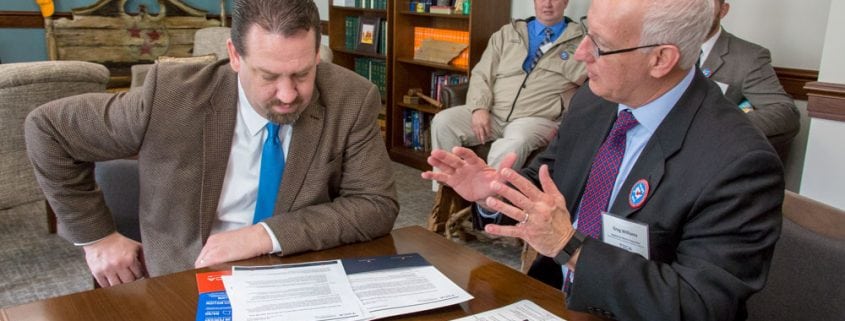Co-ops tell story of rural Tennessee during day on the hill
More than 200 electric co-op leaders from across the state were in Nashville on Monday and Tuesday, Jan. 29 and 30, for the 2018 Tennessee Electric Cooperative Association Legislative Conference. During meetings with legislators on Capitol Hill, co-op members and employees stressed the important role that co-ops play in their communities and briefed lawmakers on issues that impact rural and suburban Tennessee.
Lt. Gov. Randy McNally opened the meeting on Tuesday morning. “I’d like to welcome you here to Nashville,” he said. “I appreciate the job you do.”
Tennessee’s electric cooperatives maintain a visible presence in Nashville and Washington, D.C., to protect the interests of co-op and their consumer-owners. “We are here to give a voice to rural Tennesseans,” says David Callis, CEO of the Tennessee Electric Cooperative Association. “We must tell the electric cooperative story and educate lawmakers about the impact of proposed legislation.”
“Advocating for our members doesn’t stop at the edge of our service territory,” said Michael Watson, president of TECA’s board of trustees and CEO of Duck River Electric Membership Corporation. “It is critically important that our elected leaders in Nashville keep cooperatives in mind when crafting laws and regulations that impact us. We have a responsibility to our communities to tell their story.”
Co-ops addressed three specific issues during their visits this year:
- Co-ops asked lawmakers to support Senate Bill 1646 and House Bill 1591 that will speed the deployment of broadband by allowing co-ops to utilize existing easements for nonelectric purposes such as telecommunication services.
- Co-ops expressed support for Senate Bill 1752 and House Bill 1773 that will elevate the charges of assaulting a utility worker and makes them consistent with penalties already in place to protect other first responders.
- While legislation has not yet been filed, a final issue discussed was an effort by the Department of Revenue to apply sales tax to fees paid by utility consumers. Co-ops asked the General Assembly to enact legislation to protect utility consumers from these additional taxes.
“Educated and informed legislators are necessary for us to provide low-cost, reliable power, and our legislators listen when we come to visit,” said Callis. More than 100 legislative visits were made during the conference, and many legislators from across the state attended a reception honoring members of the Tennessee General Assembly.




